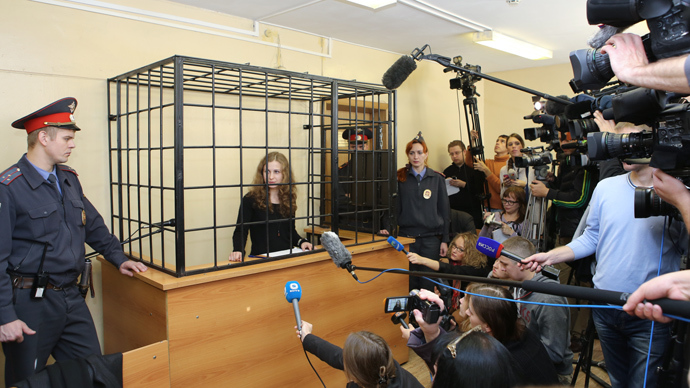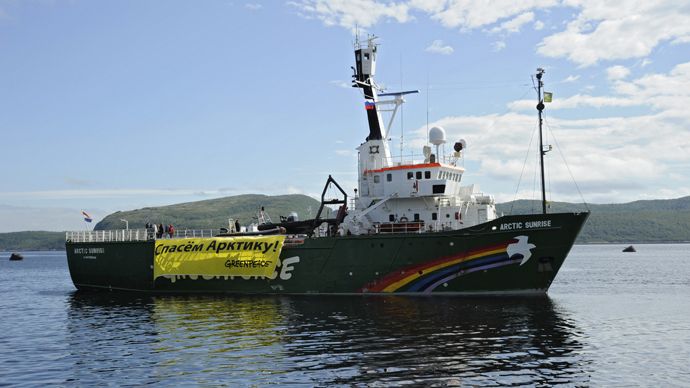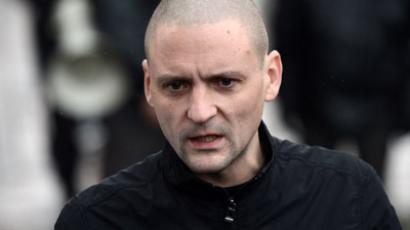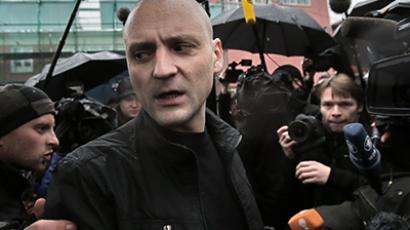Pussy Riot, Greenpeace activists granted amnesty as State Duma passes bill

Russia’s lower house of parliament has given a third reading to the amnesty bill, which means jailed members of Pussy Riot punk band may be freed before the New Year and charges against arrested Greenpeace activists are also to be dropped.
Alex (UK) "TBH, I'm feeling strange. A lot of relief to be going home, though we don't know when. It's a bit emotional, what a journey!" 1/2
— Arctic Sunrise (@gp_sunrise) December 18, 2013
State Duma deputies on Wednesday unanimously supported the amnesty legislation submitted by President Vladimir Putin earlier this month to coincide with the 20th anniversary of the country’s Constitution. The legislation could come into force as early as this week, after it is officially published.
Pussy Riot’s Nadezhda Tolokonnikova and Maria Alyokhina, who are both subject to the amnesty, may be released from prison by New Year’s Eve, their lawyer Irina Khrunova told journalists.
“As a matter of fact, the situation entirely depends on whether the administrations of their penal colonies want their soonest release, but I think they would not like to procrastinate the release process for the two girls,” she said, as cited by Itar-Tass.
Tolokonnikova and Alyokhina are serving two-year jail terms for hooliganism for their protest action, called a “punk prayer,” in Moscow’s Christ the Savior Cathedral in February 2012. The band’s third convicted member, Yeakterina Samutsevich, who received a suspended sentence, is also subject to the amnesty bill, the lawyer said.
Amnesty for Arctic 30
With the approval of the amnesty bill, the 30 members of the Greenpeace’s Arctic Sunrise crew who were detained in September after staging a protest at Gazprom’s Prirazlomnaya oil rig in the Barents Sea will also be finally able to go home.
The activists are currently on bail and have been awaiting trial in Russia.

Initially, the activists – who are nationals of 18 different countries – were detained on piracy charges, which meant they could face up to 15 years in jail. However, investigators later reduced the charges to hooliganism.
The arrest of the so-called ‘Arctic 30’ stirred bitter criticism from various rights organizations. Greenpeace also organized protests across the globe, demanding that the Arctic Sunrise crewmembers – 28 environmentalists and two journalists – be freed.
One of the activists, Ana Paula Maciel from Brazil, said she was “relieved” at the news, but “not celebrating.”
“I spent two months in jail for a crime I didn’t commit and faced criminal charges that were nothing less than absurd,” Greenpeace’s website reported her as saying. “Right now my thoughts are with our Russian colleagues. If they accept this amnesty, they will have criminal records in the country where they live, and all for something they didn’t do.”
President Vladimir Putin, commenting earlier on Greenpeace’s protest, said their actions threatened the lives of those who worked on the Prirazlomnaya oil rig.
“When [somebody] is climbing on the platform [they] are creating an emergency situation, [and] the operator [of the rig] could have made more than one error. They are distracted from the ongoing work. Among other things, there were divers underwater and their lives were in danger,” he said.
Bolotnaya protest prisoners
The amnesty also covers several opposition activists facing charges following last year’s protest on Bolotnaya Square in Moscow against alleged violations during parliamentary and presidential elections. The rally resulted in violent clashes between protesters and police.
Charges against nine protesters – who are accused of taking part in mass unrest, or calling for it – may soon be dropped. Protesters who attacked police will not be included in the amnesty, however.
The amnesty also does not cover the alleged organizers of the mass unrest on May 6, 2012:Left Front movement leader Sergey Udaltsov and Leonid Razvozzhayev.
Udaltsov is currently under house arrest and may face up to 10 years behind bars. Razvozzhayev is in custody and may also spend up to a decade in prison. Court hearings into the case will begin December 26.

Criminal proceedings against 28 people were launched in the aftermath of a rally on Bolotnaya Square a day before Putin’s inauguration as president. Seventeen of the suspects are in detention, while two are on the wanted list. In November 2012, one the rioters – Maksim Luzyanin – was sentenced to 4 1/2 years behind bars.
According to the Russian Prosecutor General’s Office, 82 police officers were injured as a result of the Bolotnaya clashes, and the total damage to property has been estimated at over 28 million rubles ($900,000).
In total, about 25,000 people will be eligible for release or exemption from criminal liability.














